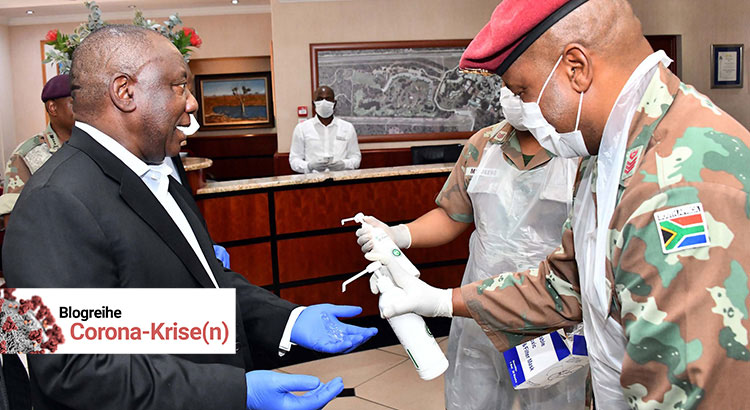Although corona is a global health threat, immediate reactions to contain its spread have mainly followed a logic of national sovereignty, threatening many of the hard-won achievements of decades of international cooperation. In this situation, the African Union (AU) is a rare case of internationalism: it has played an important role in providing coordination, expertise and technical support to its member states, engaging in advocacy, and mobilizing resources. It is imperative to applaud, but more so to support the AU in continuing to play its vital role as one of the few islands of internationalism these days.
Kategorie: Serien/Reihen

From Russia with Love?! Putin and the Pandemic
For Russia the novel SARS-CoV-2 still seems to be the best of a bad lot, as the country still reports relatively low numbers of infected people. But, if coupled with other pre-existing problems (power transfer and economic hardships), the pandemic could exacerbate an already unstable situation and lead to new unpredictable foreign policy moves. Russia’s strategy in times of SARS-CoV-2 is most likely going to be threefold: further working on its global image by sending aid and offering assistance; shifting its focus from the near abroad to great power politics; and doubling up the ongoing information warfare if the first two do not bring immediate results.
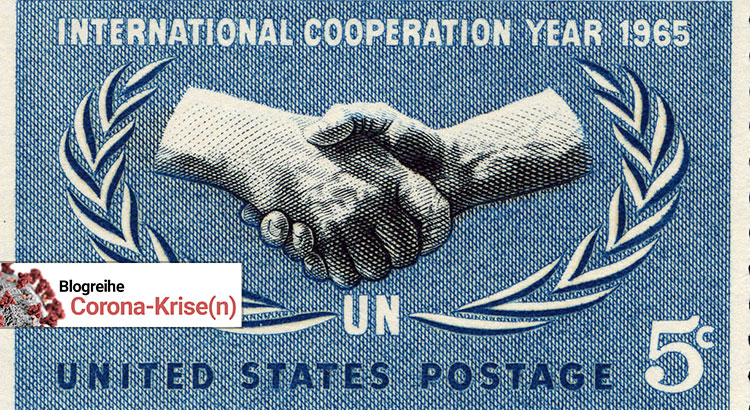
Infizierte Weltordnung: Ende des Lagerdenkens – Comeback der UN!
Das Corona-Virus könnte die schon länger kriselnde internationale Ordnung grundlegend verändern. In den Reaktionen auf die globale Pandemie deutet sich – so unsere These – ein einschneidender Paradigmenwechsel an: Das bisher dominante Paradigma des Wettkampfs wird Schritt für Schritt abgelöst von einem neuen Paradigma der Kooperation. Noch ist unklar, wie nachhaltig dieser Trend ist. Aber die Krise macht Wandel möglich. Globale Solidarität lautet das Wort der Stunde: Es ist Zeit für egalitären Multilateralismus – und ein Comeback der UN.
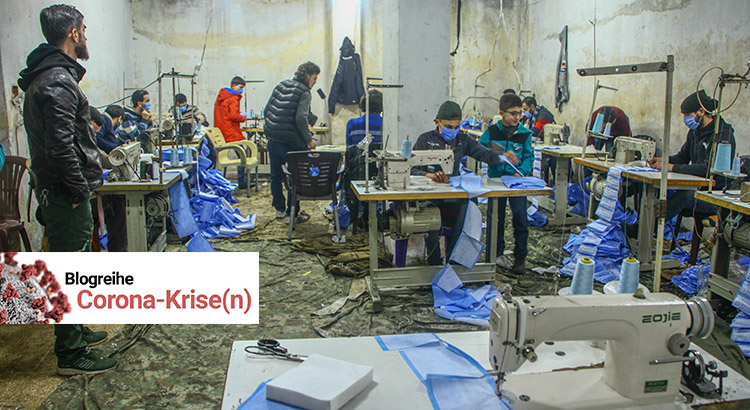
Corona und die humanitäre Situation in Syrien: Die drohende Katastrophe in der Katastrophe
In der aktuellen Berichterstattung über die COVID-19-Pandemie wird kaum über das Schicksal derer berichtet, für die die Coronaviruskrise eine dramatische Verschlechterung ihrer ohnehin oft hoffnungslosen Situation bringen könnte: Vertriebene, Flüchtlinge, Menschen in Konfliktgebieten. Die Corona-Krise droht existierende humanitäre Krisen zu verschärfen. Ein Blick auf Nordsyrien zeigt, dass ein COVID-19-Ausbruch in solchen Situationen einerseits neue Konflikte hervorrufen und andererseits die COVID-19-Pandemie selbst weiter verschärfen könnte.
COVID-19 as a Threat to Civic Spaces Around the World
As countries across the globe are desperately trying to control the COVID-19 pandemic, a rapidly increasing number of governments have started to impose severe restrictions on core civic freedoms. Although restrictions are currently necessary to save lives and protect health care from overburdening, these emergency measures must be proportional and strictly limited in time. It is crucial to monitor how restrictions are implemented to prevent governments from using the current crisis to justify new constraints on civic spaces, which have already have been shrinking in many places during the last 15 years.

The Visual Culture of Far-Right Terrorism
The recent wave of far-right terrorist attacks challenges academic knowledge on extremist violence and demands a new perspective. Rather than acting on behalf of political organizations, most of the perpetrators promote digital hate communities that predominantly interact via visual language such as memes. These images, which are often-humorous, aim to accustom users to violence and make neo-Nazism accessible and appealing through modern aesthetics and pop-cultural references. Hence, to fully understand contemporary far-right terrorism and its underlying worldviews, we need to systematically analyse visual mobilisation and persuasion strategies. This blog post makes the case for a visual culture perspective and transdisciplinary visual analysis to examine how far-right actors radicalise sympathisers in loosely organised online networks.

The Coronavirus as a Means to an End: Extremist Reinterpretations of the Pandemic
Various aspects of society and everyday life have become affected by the clampdown on the Coronavirus pandemic and the restrictions enforced to prevent it from spreading. While the spread of COVID-19 continues to be fought and researched under extreme pressure, many uncertainties remain regarding its origin and the social, political and economic consequences. These uncertainties are easily exploited by extremists such as right-wing and Islamist extremists. The spread of the Coronavirus is thus accompanied by the propagation of extremists’ discourses. Within a short period of time, they reach thousands of people – not only but especially via social media.
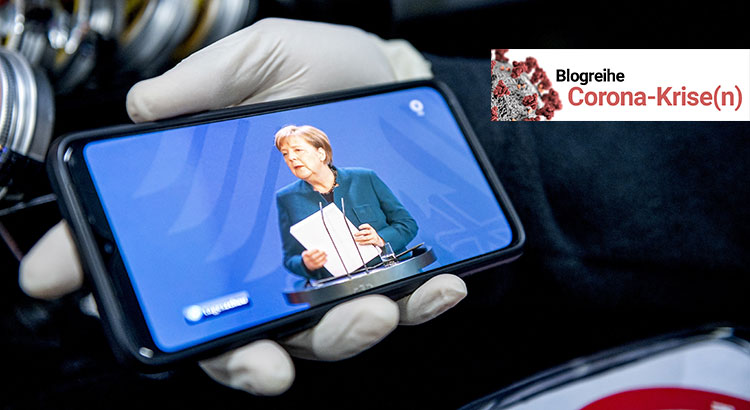
Corona ist mehr als eine Krise
Die Rede an die Nation von Angela Merkel markiert in verschiedener Hinsicht einen Wendepunkt in der Corona-Krise: Die Maßnahmen werden akzeptiert, die politische Kontroverse kehrt zurück, die Krisenfelder erweitern sich. Einleitung zu einer PRIF-Blogreihe.
What Makes Far-Right Rhetoric so Dangerous?
After a series of right-wing terrorist acts in Germany, the role of far-right rhetoric in inciting violence is much debated. Forms of hate speech in particular have caught a lot of attention in this debate. Drawing on the concept of dangerous speech, this article illuminates why narratives of imperilment are more critical for understanding far-right violence than open hatred. By constructing myths of victimhood, they make violent action seem necessary – even if violence is not proposed explicitly.
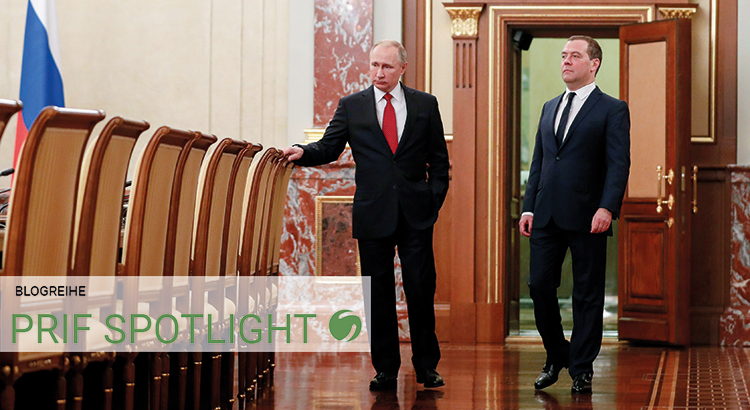
Lost in Transition? Putin’s Strategy for 2024
Speculations about “Транзит“ or transfer of power have circulated in the Russian mass media since Vladimir Putin got elected as the President of the Russian Federation for the fourth time in March 2018. The turbulent political events of the first weeks of 2020 shed some light on Putin’s strategy for his future. In case he chooses to leave the president’s chair, he will hardly be able to fully control the handover of power and will likely face some unintended consequences.
